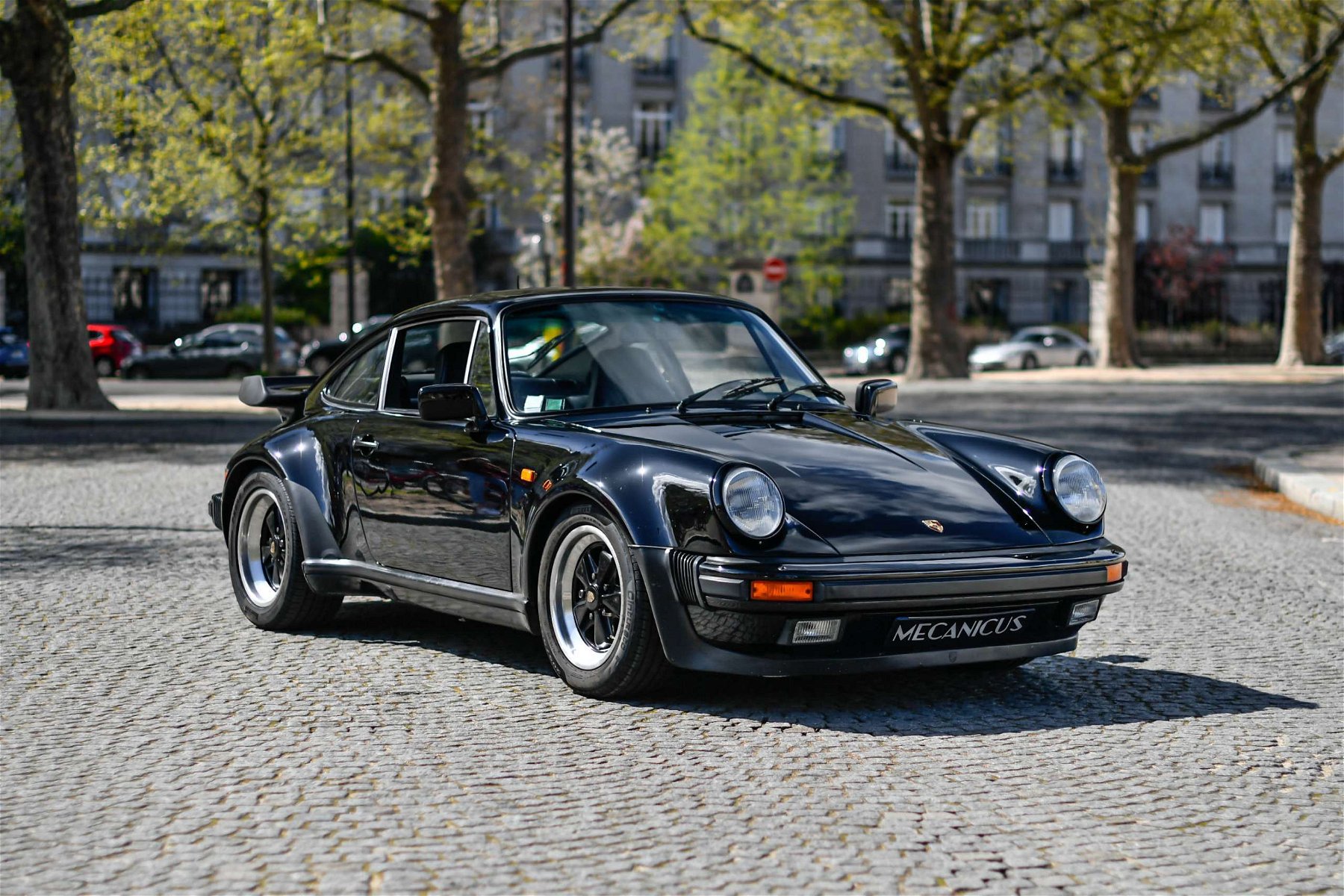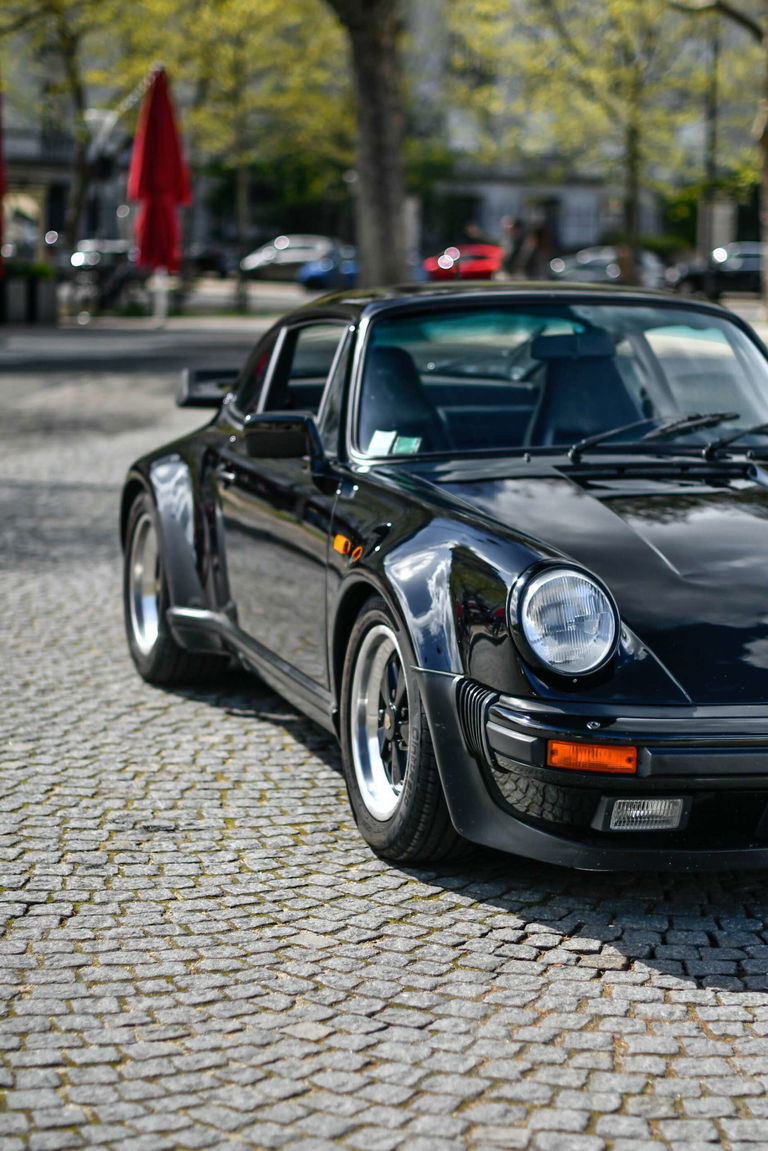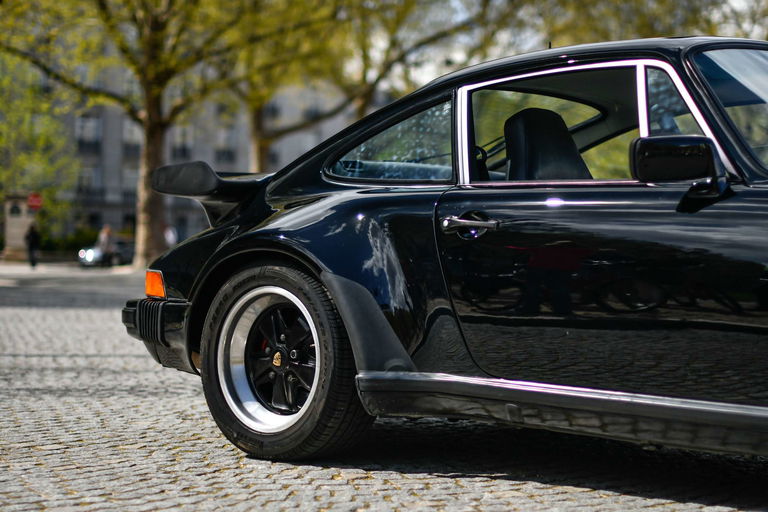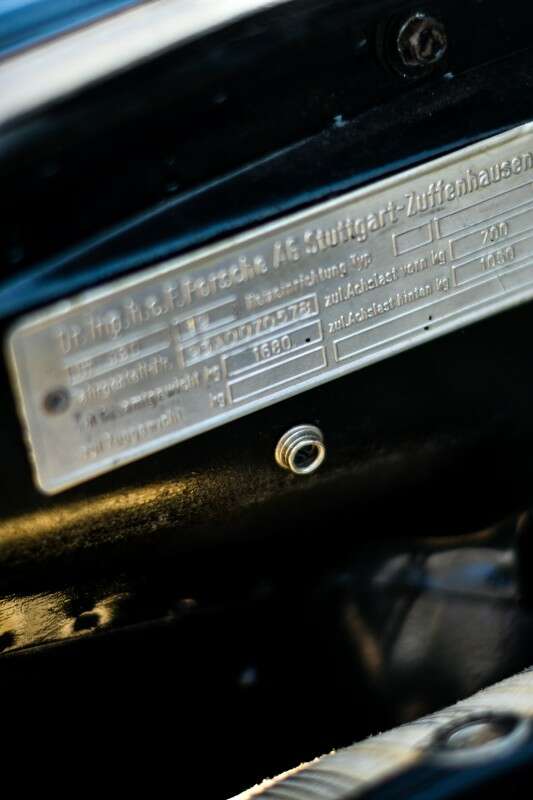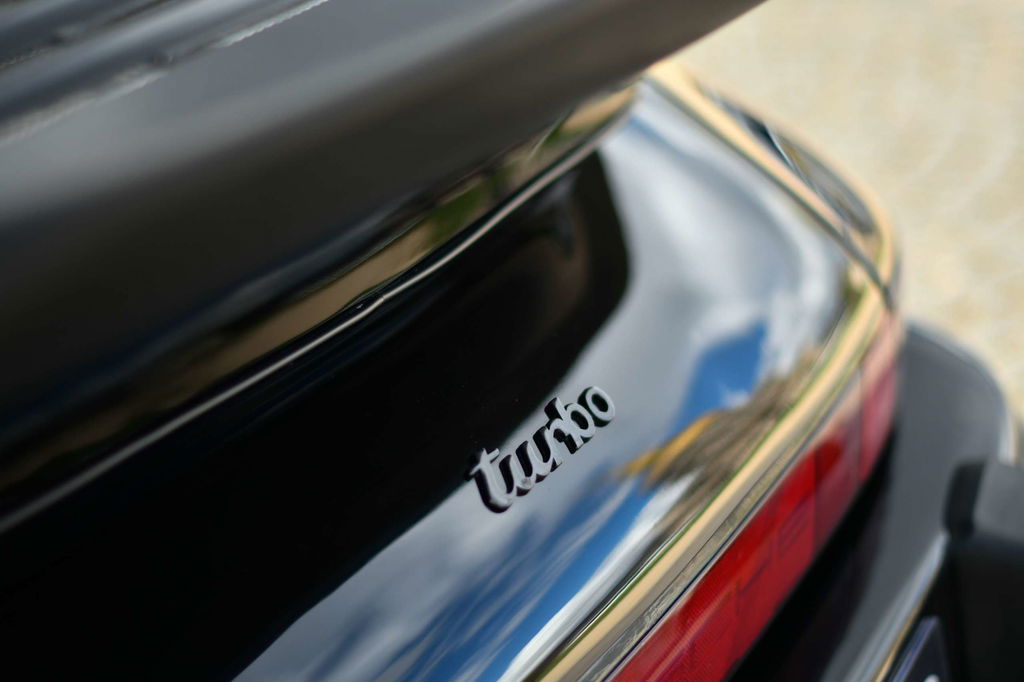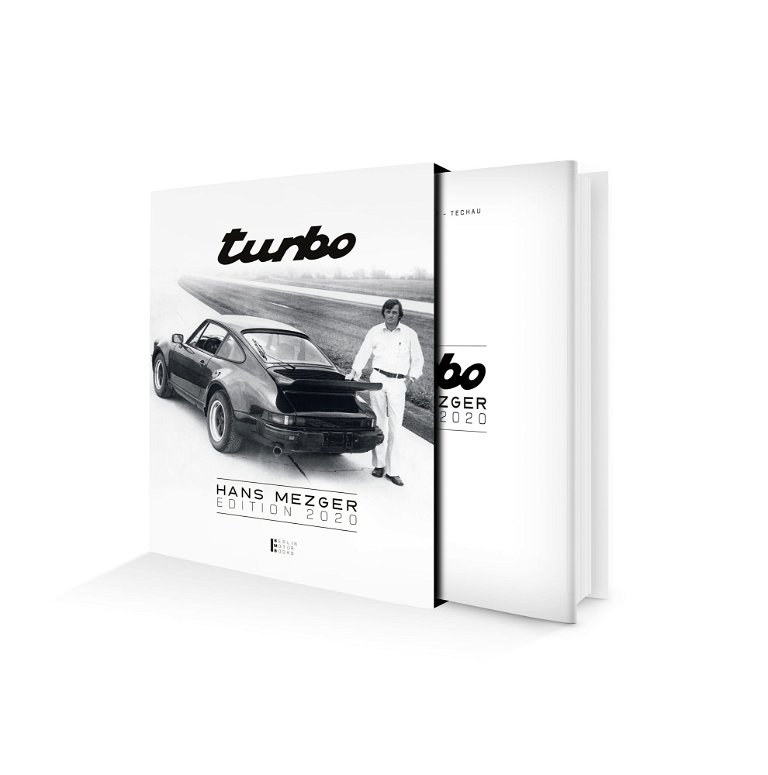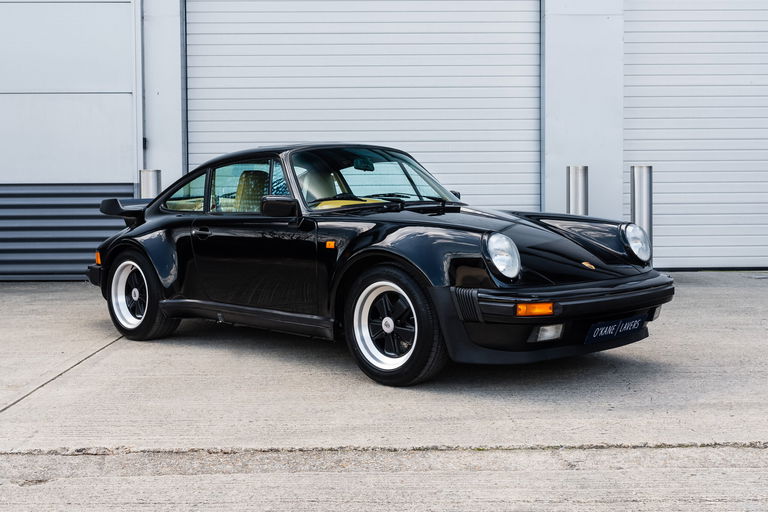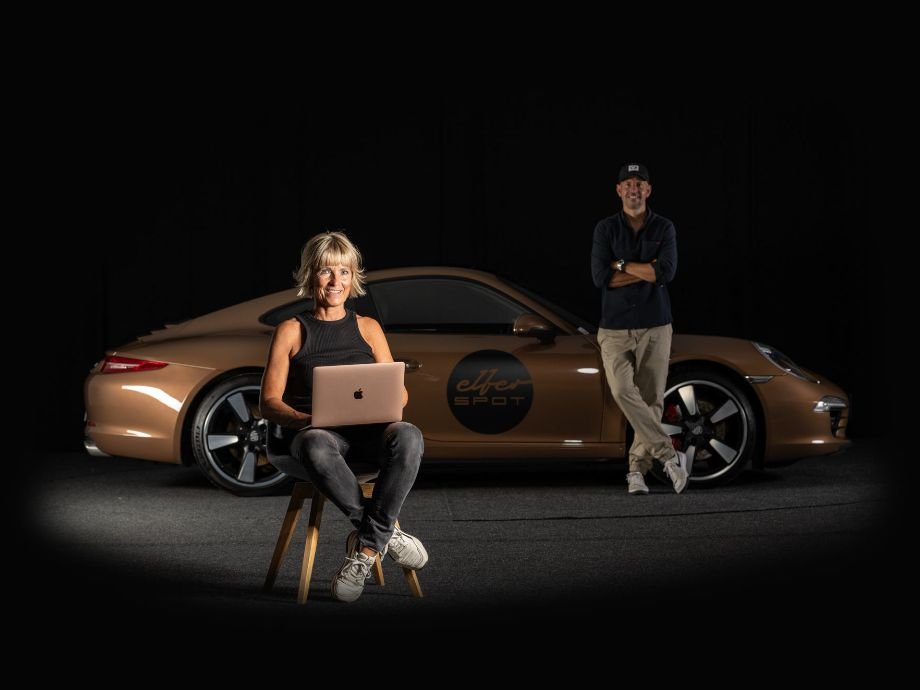– The clutch as well as the spark plugs, belts and O-rings of the air conditioning were changed in January 2021
Not escaping the disease of the 930 and other “G”, the speedometer has been replaced twice: on 07/13/10 at 107,299 km and then on 01/31/12 at 107,950 km at Porsche on invoice.
The only difference is that the front and rear calipers are 964 type and the turbine was painted in red.
This is a rare opportunity to acquire a French 930 3.3 liters in a sought after configuration, equipped with a sunroof and sport seats, all in original condition with a desirable patina!
Porsche 930, the Story
History has never had any feelings about timing. Timing is the most important ingredient for success, and one that must be mastered – especially when it comes to cars. This concept is far from being condemned to the past: it has never been so current. If fate is and was rarely kind to cars that came too early, too late, or simply came the wrong way, history will remember that one of them silenced the prognosis. What idea could have pushed Porsche to take one of the riskiest bets ever, in 1974, namely to launch its first supercar in the middle of the oil crisis? Few manufacturers could have avoided such a situation. Porsche seized the opportunity to elevate its latest protégé to the status of an untouchable icon.
To understand the context, here is a brief historical reminder. At Mecanicus, we love precision. It was in early 1973 that the Arab countries and members of the Organization of Petroleum Exporting Countries imposed an embargo against nations perceived to be supporting Israel during the Yom Kippur War. The consequences were quickly felt: the price of oil quadrupled in 1974. Manufacturers eager for big cars, producing more powerful and heavier cars, were heavily impacted. The embargo was lifted in March 1974, but it took time for the effects to fade. Porsche will take advantage of this complicated period to develop its new rocket.
Porsche had already been working for some time on a technology commonly known as “Turbocharging” on its competition cars. The 917 was the first beneficiary. However, the idea of adapting it to production cars was not on the agenda. Far from it. After numerous tests, the turbo system developed by the engineers Schäffer and Mezger proved to be particularly interesting. Porsche soon tested it on new cars in Group 5, where the freedom of the regulations allowed for new developments. The results achieved by the Carrera RSR Turbo at the 24 Hours of Le Mans and elsewhere prompted Porsche to adapt the Turbo to its six-cylinder car in order to enter Group 4. But to homologate the future 934, Porsche had to produce 400 units of a production version, called the 930.
The economic context is worrying. In the ranks of Porsche’s marketing department in Stuttgart, questions are being asked about the demand for such a car – and rightly so. The risk is high, but the bet is kept. The 930 was created for the benefit of the racing department and its performance was impressive. No other car can compete: 0 to 100km/h in 6 seconds and a top speed announced at 250 km/h. The fastest production car in the world, it also became the fastest car ever built by a manufacturer. The 930 takes Porsche into another world and sends all competitors back to their drawing boards. To dress the beast, Porsche does Porsche: it takes the elements of the 911, adding aggressive touches (wide fenders, oversized spoiler, rims and distinctive air intake). The 930 stands out mechanically and aesthetically. It will even build a reputation to match its performance: The Widow Maker… Or the widow maker.
The first 930s rolled off the production line in 1975. Whether in the United States or in Europe, the commercial success will be there. The first series, equipped with the 3.0-liter engine and responsible for the mythical nickname, will leave its place in 1978 – with 2,819 units produced – to a more sophisticated, not to say civilized, version. The 930 3.3 liter was produced for 11 years, with 18,770 units produced.
First of the “Turbo-Era” cars, the 930 is a piece of automotive history. Sexy, it participated in the arrival of a typical and aggressive style, reflection of a decadent time. Mechanically, it also reflects its era, that of the arrival and advent of the Turbo – a system that made the septics laugh, before bringing them to their knees. Today, it seems insignificant. 50 years ago, it was a real gamble. Hats off to you.
FR:
Porsche 930, l’Histoire
L’histoire n’a jamais fait de sentiment en matière de timing. Condition sine qua non de succès, ce dernier est l’ingrédient majeur, qu’il faut savoir apprivoiser – surtout en matière d’automobile. Ce concept est d’ailleurs bien loin d’être condamné au passé : il n’a jamais été aussi actuel. Si le sort n’est et ne fut que rarement clément pour les autos venues trop tôt, trop tard ou tout simplement mal venues, l’histoire retiendra que l’une d’entre elles aura fait taire les pronostics. Quelle idée a bien pu pousser Porsche à tenter l’un des paris les plus risqués qui soit, en 1974, à savoir lancer sa première supercar en plein choc pétrolier ? Peu de constructeurs auraient pu se dépêtrer d’une pareille situation. Porsche l’a saisi, pour élever sa dernière protégée au rang d’icône intouchable.
Pour bien comprendre le contexte, voilà un bref rappel historique. Chez Mecanicus, nous aimons la précision. C’est au début de l’année 1973 que les pays arabes et membres de l’organisation des pays exportateurs de pétrole imposent un embargo à l’encontre des nations perçues comme soutenant Israël pendant la guerre du Kippour. Les conséquences se sont rapidement fait sentir : le prix du baril quadruple en 1974. Les constructeurs avides de grosses cylindrées, produisant des autos plus puissantes et plus lourdes sont lourdement impactés. Levé en Mars 1974, les effets de cet embargo vont cependant prendre du temps à s’estomper. Porsche va profiter de cette période compliquée pour développer sa nouvelle fusée.
Porsche travaillait déjà depuis quelque temps sur une technologie communément appelée “Turbocompression” sur ses autos de compétition. La 917 en fut la première bénéficiaire. Pour autant, l’idée de l’adapter aux voitures de production n’était pas à l’ordre du jour. Loin de là. Après de nombreux essais, le système de Turbo mis au point par les ingénieurs Schäffer et Mezger se révéla être particulièrement intéressant. Très vite, Porsche l’éprouva sur de nouvelles autos engagées en Groupe 5 – dont la liberté du règlement faisait part belle aux nouveautés. Les résultats obtenus par la Carrera RSR Turbo aux 24 Heures du Mans et ailleurs poussèrent Porsche à adapter le Turbo à son six cylindres pour passer en Groupe 4. Mais voilà, pour homologuer la future 934, Porsche doit produire 400 unités d’une version de série, baptisée 930.
Le contexte économique inquiète. Dans les rangs du Marketing de Porsche, à Stuttgart, les questions quant à la demande d’une telle auto se posent – à juste titre. Le risque est important, mais le pari est tenu. La 930 voit donc le jour pour le bien du département compétition et ses performances sont impressionnantes. Aucune autre auto ne peut rivaliser : 0 à 100km/h en 6 secondes et une vitesse de pointe annoncée à 250 km/h. Voiture de production la plus rapide du monde, elle devient par la même occasion la plus rapide qu’un constructeur n’est jamais construit. La 930 fait entrer Porsche dans un autre monde et renvoie tous les concurrents à leurs planches à dessin. Pour habiller la bête, Porsche fait du Porsche : on reprend les éléments de la 911, en y ajoutant des touches agressives (ailes larges, aileron démesuré, jantes et prise d’air distinctive). La 930 sort du lot et se démarque mécaniquement et esthétiquement. Elle va même se bâtir une réputation à la hauteur de ses performances : The Widow Maker… Soit la faiseuse de veuve.
Les premières 930 sortiront des chaînes de production en 1975. Que ce soit aux Etats-Unis ou en Europe, le succès commercial sera au rendez-vous. La première série, équipée du 3.0 litres et véritable responsable du surnom mythique laissera, sa place en 1978 – avec 2 819 exemplaires produits – à une version plus sophistiquée, pour ne pas dire civilisée. La 930 3.3 litres sera produite 11 ans, avec 18.770 exemplaires produits.
Première des autos de la “Turbo-Era”, la 930 est un morceau de l’histoire automobile. Sexy, elle a participé à l’arrivée d’un style typé et agressive, reflet d’une époque décadente. Mécaniquement, elle reflète là encore son époque, celle de l’arrivée puis de l’avènement du Turbo – système qui fit bien rire les septiques, avant de les mettre à genoux. Aujourd’hui, cela nous paraît anodin. Il y a 50 ans, c’était un véritable pari. Chapeau bas.
Notre Exemplaire
La Porsche 930 que nous vous proposons – VIN 93A0070578 – fut livrée neuve en France via l’importateur Sonauto, et plus précisément à Paris dans une configuration Noir / Noir. Immatriculée pour la première fois le 19/01/1981, elle fut équipée des options suivantes :
– Toit ouvrant
– Siège sport gauche
– Siège sport droit
Cette auto est toujours restée en France depuis sa vente neuve. Ayant connu quatre propriétaires durant sa vie, elle n’a subi aucun accident. Jamais restaurée, elle présente un très bel état d’origine dotée d’une patine remarquable. Le kilométrage et l’historique sont retraçable depuis 1997 grâce à un important dossier de factures. La mécanique fut entièrement refaite à 93.480 km sur facture. De très nombreux frais ont été faits depuis :
– Les amortisseurs AR ont été changés en janvier 2021
– L’embrayage ainsi que les bougies, courroies et joints toriques de clim ont été changés en janvier 2021
– La pompe à essence a été changée en 2018
– L’alternateur a été changé en 2014
– Les plaquettes ont été changées et la climatisation rechargée en 2013
– Elle a reçu une peinture complète en 2012
N’échappant pas à la maladie des 930 et autres “G”, le compteur a été remplacé deux fois : le 13/07/10 à 107.299 km puis le 31/01/12 à 107.950 km chez Porsche sur facture.
Seules entorses à l’origine, les étriers AV et AR sont de type 964 et la turbine fut peinte en rouge.
Il s’agit d’une rare opportunité d’acquérir une 930 3.3 litres d’origine française dans une configuration recherchée, équipée d’un toit ouvrant et des sièges sport, le tout dans un état orignal à la patine désirable !
